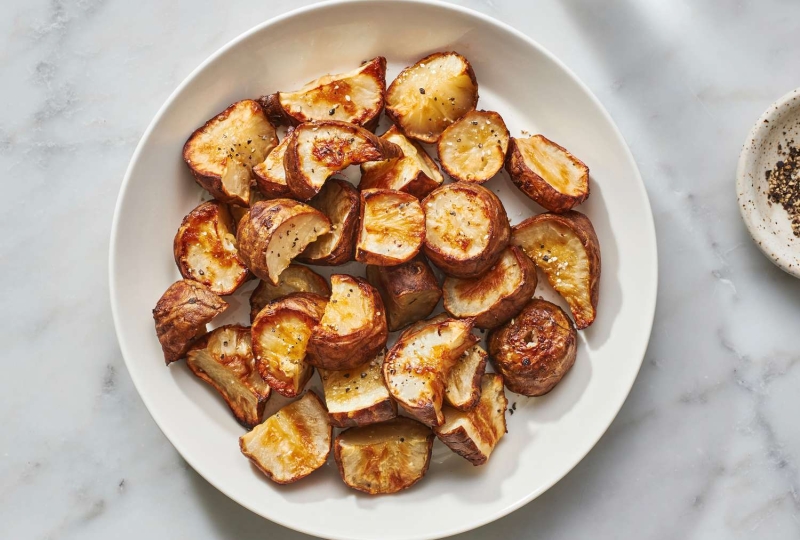Prep: 20 mins
Cook: 45 mins
Total: 65 mins
Servings: 4 servings
If you’re looking for an alternative to oven-roasted potatoes, but want a nutty root vegetable you can roast and prepare much in the same way, look no further than the sunchoke—also known as Jerusalem artichoke.
What Are Sunchokes, a.ka. Jerusalem Artichokes?
These knobby-looking tubers resemble ginger root but taste nothing like them. The Jerusalem artichoke, or sunchoke, is actually the thickened underground part of a stem (a tuber) of a breed of sunflowers. Hence, the name sunchoke.
This vegetable is mildly sweet, crunchy, and nutty, almost like a cross between potato and jicama. You can find them at bigger grocery stores with more extensive produce departments and at many farmers’ markets. Their season runs from October to about April.
Sunchokes require a careful washing before cooking because dirt can get trapped in all those knobby bits. You don't need to peel them before cooking them, though you can if you like (this skin is papery and thin).
Once washed, cut them into thick slices or chunks and prepare them the same way you would potatoes. Sunchokes can be substituted in any recipe calling for potatoes.
What to Serve with Roasted Sunchokes?
Roasted sunchokes are crispy on the outside, tender in the middle, and slightly sweet-tasting. They are great paired with other roasted vegetables, like broccoli, red onions, or asparagus—you can even roast everything together in the oven at the same time.
Serve alongside pork chops, steak, or roast chicken. Leftovers are great reheated the next day, mixed into a frittata or quiche, or made into a salad for lunch.
Cooking Tip!
Roast these sunchokes alongside any other vegetables or main dishes that you have in the oven. It's fine to roast them as low as 375 F or as high as 450 F if you have other things that need to cook at an exact temperature. Just adjust the cooking time to be more or less to accommodate the lower or higher oven temperature.
Why Do Sunchokes Sometimes Cause Gas?
This vegetable contains high levels of inulin, a non-digestible carbohydrate that is fermented by gut bacteria and which often causes gas. Sunchokes seem to cause more issues for people in its raw form, and not everyone will be affected in the same way by sunchokes.
To avoid gassiness, serve sunchokes with a mix of other vegetables and proteins. If you're new to eating sunchokes, try a small portion before eating more until you know how they affect you.
This is such an easy way to enjoy sunchokes when they’re in season. Just chop them up and roast them alongside anything else you have in the oven. I like to roast my sunchokes on the longer end of the time range so they get really golden and extra-crispy! -Emma
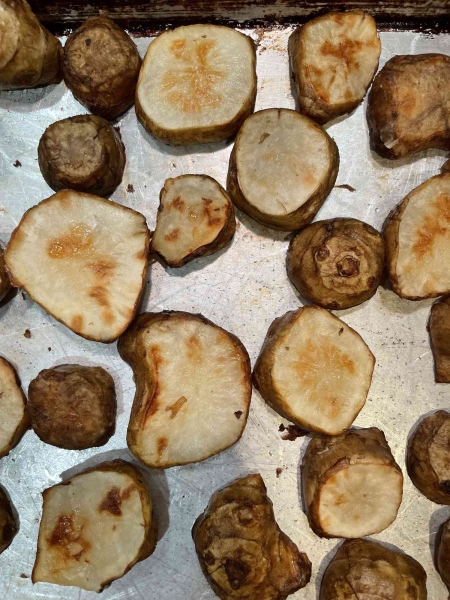
A Note From Our Recipe Tester
Ingredients
-
2 pounds sunchokes
-
1 tablespoon olive oil
-
1/2 — 1 teaspoon salt
-
Freshly ground black pepper, to taste
Steps to Make It
-
Gather the ingredients.
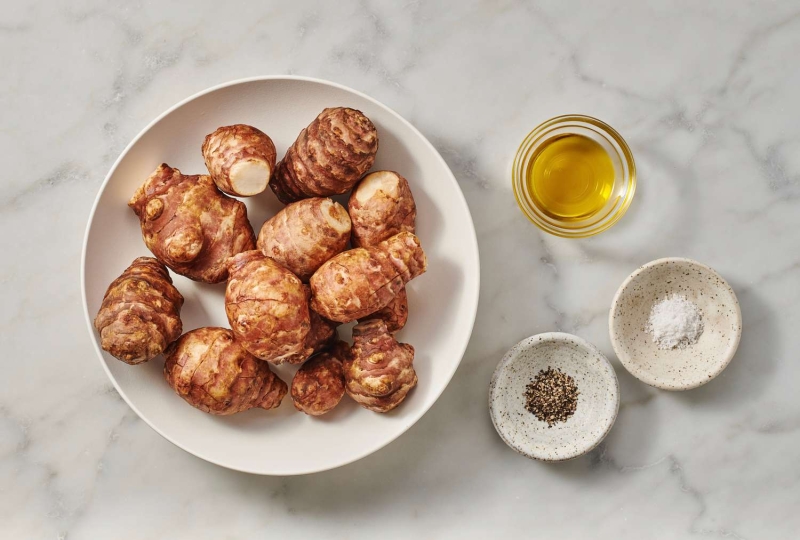
-
Pre heat oven to 425 F. Slice sunchokes into 1-inch pieces.
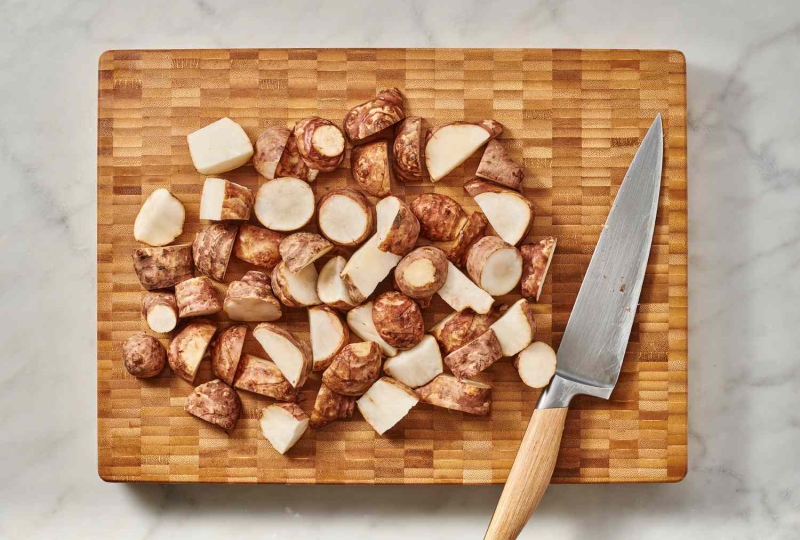
-
Toss on a baking sheet or roasting pan together with olive oil and salt, coating well. Turn all the pieces so they have one cut-side down, which will help them become crispy and golden.
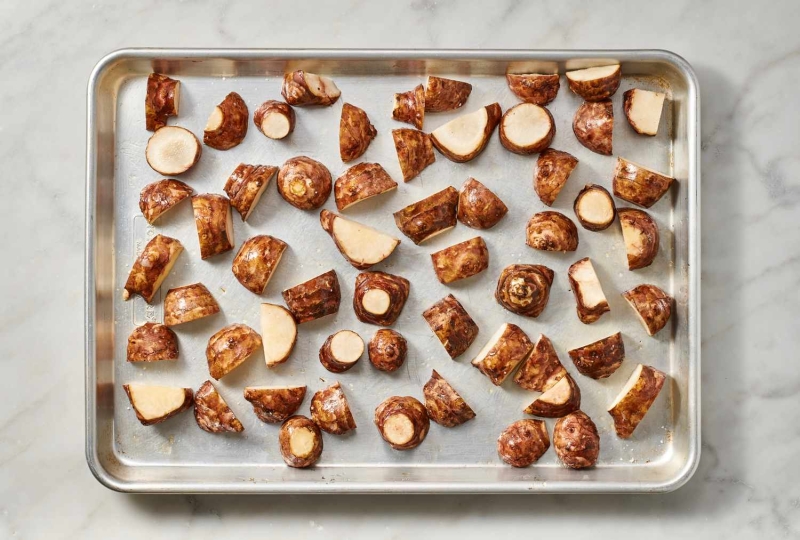
-
Roast sunchokes in the oven for 35 to 45 minutes, flipping once or twice during cooking, until easily pierce with a fork and golden brown. Season with a bit of extra salt and pepper, if desired.
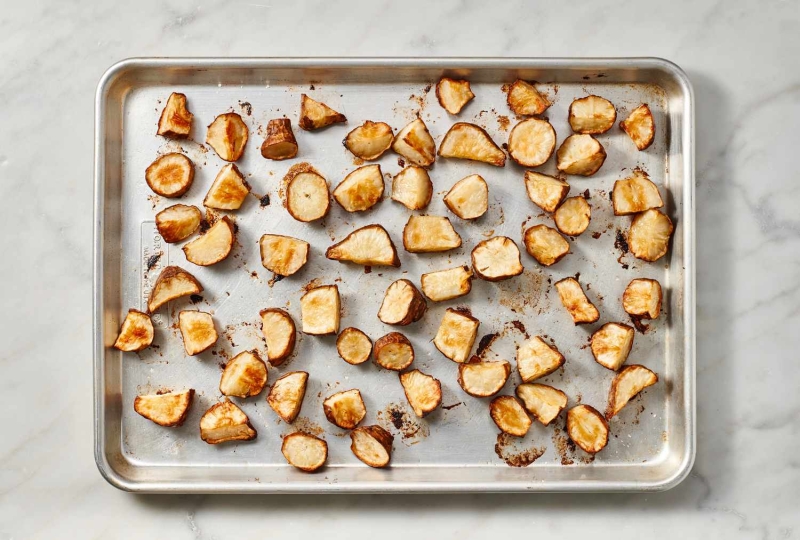
Variations
- For more depth of flavor, toss the sunchokes with 1 tablespoon of soy sauce before roasting.
- For an herby spin, toss the sunchokes with a tablespoon or so of minced fresh thyme, rosemary, or oregano (or a combination) before roasting.
- Toss with a few tablespoons chopped fresh parsley after roasting and just before serving.
How to Store Roasted Sunchokes
- These roasted sunchokes will keep in the refrigerator in an airtight container for up to 4 or 5 days. Reheat in the oven at 375 F for 10 to 15 minutes, or in a hot skillet with a little bit of olive oil.
- Freeze leftover roasted sunchokes in an airtight container or a zip-close freezer bag for up to 3 months. Reheat right from frozen in a 375 F oven for 20 to 30 minutes.
| Nutrition Facts | |
|---|---|
| Servings: 4 | |
| Amount per serving | |
| Calories | 197 |
| % Daily Value* | |
| Total Fat 3g | 4% |
| Saturated Fat 0g | 2% |
| Cholesterol 0mg | 0% |
| Sodium 591mg | 26% |
| Total Carbohydrate 40g | 15% |
| Dietary Fiber 4g | 14% |
| Total Sugars 22g | |
| Protein 5g | |
| Vitamin C 9mg | 45% |
| Calcium 35mg | 3% |
| Iron 8mg | 43% |
| Potassium 982mg | 21% |
| *The % Daily Value (DV) tells you how much a nutrient in a food serving contributes to a daily diet. 2,000 calories a day is used for general nutrition advice. | |
